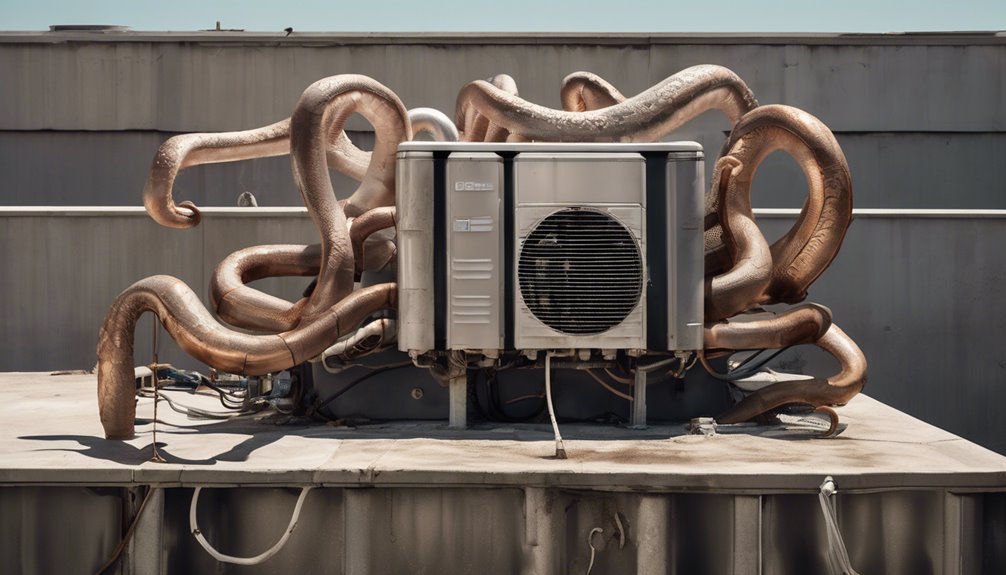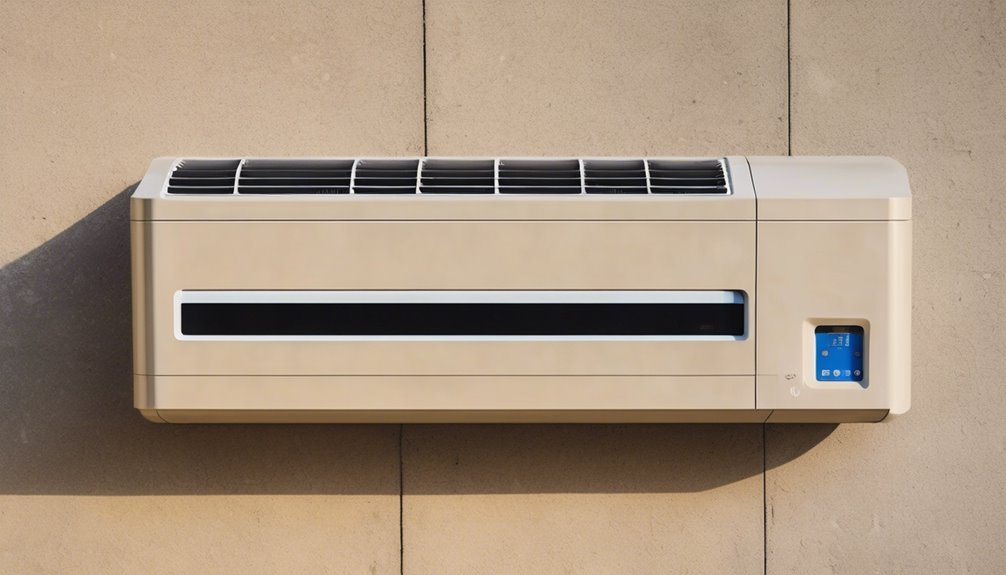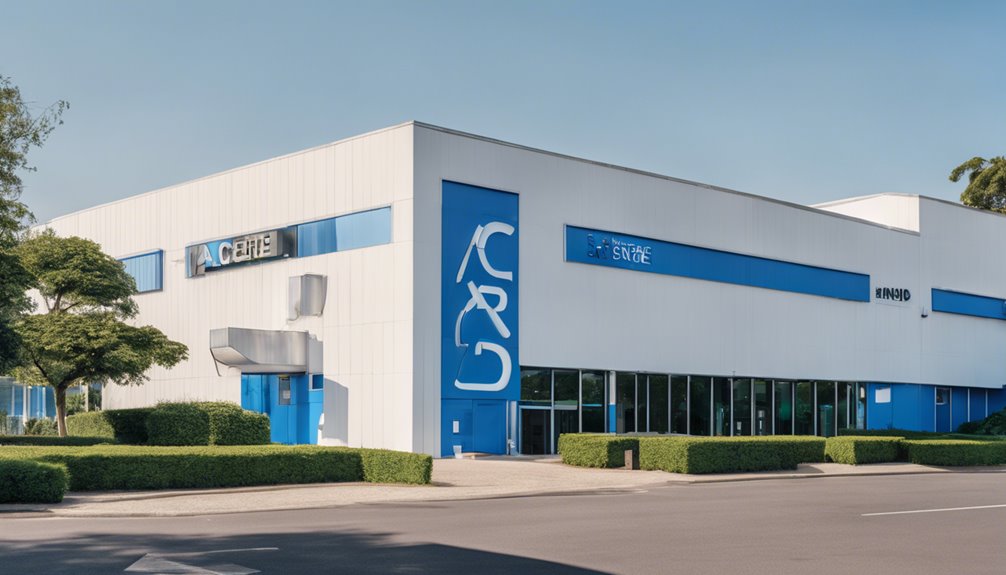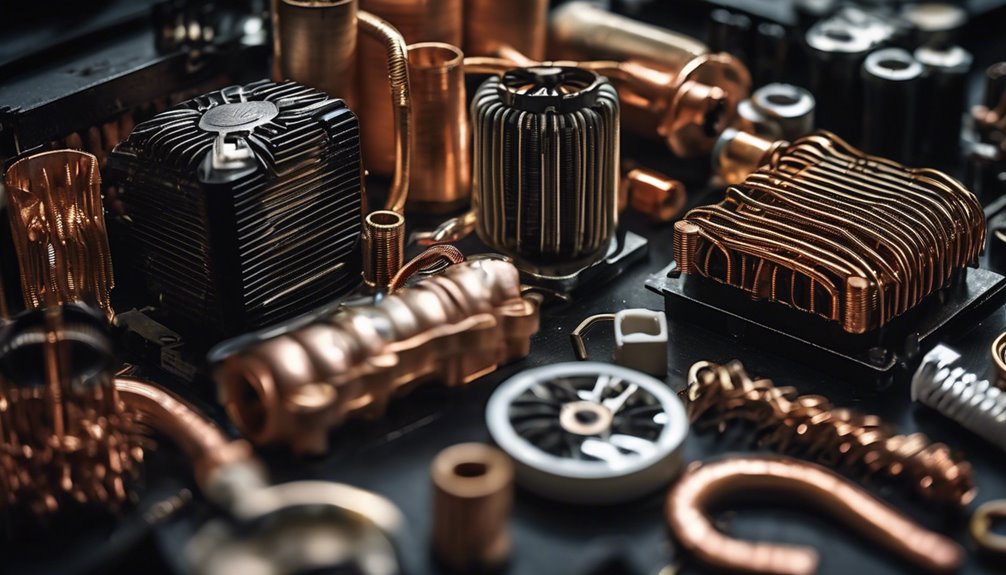You're not alone if your air conditioner loses gas frequently. Leaks in the AC system, improper installation and maintenance, and worn or damaged seals and gaskets are common culprits. Corrosion and rust in the coil, exposure to extreme weather conditions, and faulty or defective components can also contribute to the problem. As you investigate the issue, you'll likely uncover a combination of factors causing your AC to lose its cool – and its gas.
Key Takeaways
- Leaks in the AC system, including condenser coils, evaporator coils, and refrigerant lines, are a common cause of air conditioner gas loss.
- Improper installation and maintenance by unqualified professionals can lead to gas loss and reduced cooling performance.
- Worn or damaged seals and gaskets, as well as faulty or defective components, can cause refrigerant to escape and lead to gas loss.
- Exposure to extreme weather conditions, high humidity, and direct sunlight can cause components to degrade and lead to gas loss.
- Age and wear of the AC system can lead to a decline in efficiency, causing gas loss and increased energy bills.
Leaks in the AC System
Leaks in the AC system are a common culprit behind air conditioner gas loss.
You might be wondering how to identify these leaks and prevent further damage.
Identifying AC leaks is crucial to preventing further damage and ensuring your cooling system runs efficiently.
The first step is to conduct system checks to inspect the entire AC system, including the condenser coils, evaporator coils, and refrigerant lines.
If you suspect a leak, you'll need to perform pressure tests to pinpoint the exact location of the leak.
These tests will help you identify if the system is holding pressure or not.
Improper Installation and Maintenance
When you've ruled out leaks as the cause of your AC's gas loss, it's time to look at another common culprit: improper installation and maintenance.
You might be surprised how often installation errors and technician incompetence can lead to gas loss. If your AC wasn't installed correctly, it can cause refrigerant to escape, resulting in reduced cooling performance and increased energy bills.
Additionally, if the technician who installed or serviced your AC didn't follow proper procedures, it can also lead to gas loss. It's essential to ensure that your AC is installed and maintained by a qualified professional to prevent these issues.
Worn or Damaged Seals and Gaskets
As you inspect your AC system, you'll likely find that worn or damaged seals and gaskets are a common culprit behind gas leaks.
Over time, seal materials can deteriorate, gaskets can develop cracks and holes, and improper installation can lead to compromised seals. You'll need to check for these issues to identify the root cause of your AC's gas loss.
Seal Material Deterioration
Over time, the seals and gaskets in your AC system can deteriorate, leading to refrigerant leaks and reduced system performance.
This deterioration is often caused by material fatigue, which occurs when the seals and gaskets are subjected to repeated stress and pressure.
As a result, the seal material begins to break down, causing tiny cracks and openings that allow refrigerant to escape.
Three common factors contribute to seal material deterioration:
- Aging: Seals and gaskets have a limited lifespan and will eventually deteriorate over time.
- Chemical reactions: The refrigerant and other chemicals in your AC system can react with the seal material, causing it to break down.
- Temperature fluctuations: Extreme temperature changes can cause the seal material to expand and contract, leading to seal decomposition.
Gasket Cracks and Holes
You've identified seal material deterioration as a possible cause of refrigerant leaks in your AC system.
Now, it's time to inspect the gaskets for cracks and holes. Over time, gaskets can become worn or damaged, allowing refrigerant to escape.
Perform a thorough gasket inspection to identify any signs of wear or damage. Check for cracks, holes, or soft spots that could be allowing refrigerant to leak out.
If you find any damaged gaskets, replace them with new ones to prevent further leaks. Gasket replacement is a relatively simple process, but it's crucial to ensure a tight seal to prevent refrigerant loss.
Improper Seal Installation
Faulty seal installation can lead to worn or damaged seals and gaskets, which are common culprits behind refrigerant leaks in AC systems.
You might be wondering how this happens. It's simple: when seals and gaskets aren't installed correctly, they're more prone to damage and wear.
To ensure your AC system is leak-free, you should:
- Conduct regular seal inspection to identify any signs of wear or damage.
- Perform seal testing to detect even minor leaks.
- Replace worn or damaged seals and gaskets promptly to prevent refrigerant loss.
Corrosion and Rust in the Coil
When you inspect the AC's coil, you'll want to consider the material it's made of, as some are more prone to corrosion than others.
You'll also need to check for moisture accumulation points, like clogs or blockages, that can accelerate rust formation.
Additionally, you should investigate whether acidic air in the environment is influencing the coil's condition, as it can react with the metal and cause further damage.
Coil Material Matters
The air conditioning coil's material composition plays a significant role in preventing corrosion and rust, two common culprits behind AC gas leaks.
You mightn't know that the type of material used in your AC's coil can significantly impact its performance and lifespan.
When it comes to coil materials, you should be aware of the following:
- Copper benefits: Copper coils are more resistant to corrosion and provide better heat transfer, making them a popular choice for AC units.
- Aluminum drawbacks: Aluminum coils, on the other hand, are more prone to corrosion and rust, especially when exposed to moisture and air.
- Coating importance: Some coils have a protective coating to prevent corrosion, but even these can wear off over time, leaving the coil vulnerable to damage.
Moisture Accumulation Points
Moisture accumulation points within your AC's coil can be breeding grounds for corrosion and rust, silently sabotaging your system's performance. These points are often created by humidity sources, such as high ambient temperatures, poor air circulation, and nearby water sources. As condensation points, they attract and trap moisture, leading to corrosion and rust.
| Moisture Sources | Condensation Points |
|---|---|
| High ambient temperatures | Coil fins |
| Poor air circulation | Coil tubes |
| Nearby water sources | Drainage channels |
| Human activities (cooking, showering) | Evaporator coils |
Identifying and addressing these moisture accumulation points can help prevent corrosion and rust, ensuring your AC system runs efficiently and effectively.
Acidic Air Influence
Acidic air seeping into your AC system can silently wreak havoc on your coil, accelerating corrosion and rust.
When air pollution combines with moisture, it creates an acidic environment that's highly corrosive to your AC's coils. This can lead to leaks, which in turn, cause gas loss.
- Corrosion acceleration: Acidic air reacts with the coil's metal, accelerating corrosion and weakening its structure.
- Rust formation: Moisture and acidic air combine to form rust, which compromises the coil's integrity and leads to leaks.
- Coil damage: Prolonged exposure to acidic air can cause irreparable damage to the coil, requiring costly replacements.
Refrigerant Overcharge or Undercharge
You've probably heard that refrigerant overcharge or undercharge can cause your AC to lose gas, but what does that really mean?
In simple terms, it means that your AC's refrigerant level is off-balance. When your AC is installed or serviced, the technician needs to charge it with the right amount of refrigerant.
If they add too much or too little, it creates a refrigerant imbalance. This imbalance can cause your AC to leak refrigerant, leading to a loss of cooling performance and eventually, a complete system failure.
Charging mistakes are common, especially if the technician is inexperienced or doesn't follow the manufacturer's guidelines.
To avoid this, make sure to hire a reputable and licensed technician to install or service your AC.
Clogged Air Filters and Coils
Since your AC relies on efficient airflow to operate effectively, clogged air filters and coils can significantly impede its performance, leading to refrigerant loss and a host of other problems.
Efficient airflow is key to AC performance, but clogged filters and coils can lead to refrigerant loss and a multitude of issues.
When air filters become clogged, they restrict airflow, causing your AC to work harder and increasing the pressure on the system. This can lead to refrigerant leaks and other issues.
- Dust buildup: Dust and debris can accumulate on your AC's coils and filters, blocking airflow and causing the system to malfunction.
- Filter blockage: A clogged filter can reduce airflow, leading to increased pressure and stress on the system, which can cause refrigerant leaks.
- Inefficient cooling: When your AC's coils are dirty or clogged, they can't cool the refrigerant effectively, leading to a buildup of pressure and potential leaks.
Faulty or Defective Components
Your air conditioner's internal components are its lifeblood, and when they malfunction or fail, refrigerant loss is often the result.
Component failure can occur due to various reasons, including manufacturer defects. If you've recently installed a new AC and it's already losing gas, it's possible that one or more components were faulty right from the start.
In some cases, manufacturer defects can lead to premature component failure, causing refrigerant leaks. It's essential to identify and replace defective components as soon as possible to prevent further damage.
Regular maintenance and inspections can help detect faulty components before they cause significant problems.
Exposure to Extreme Weather Conditions
How often have extreme temperatures and weather conditions been putting your air conditioner to the test?
You mightn't realize it, but exposure to extreme weather conditions can cause your AC to lose gas frequently.
Climate fluctuations can weaken your AC's weather resistance, making it more prone to gas leaks.
- Temperature fluctuations: Extreme heat or cold can cause the AC's components to expand and contract, leading to tiny cracks that allow refrigerant to escape.
- Humidity and moisture: High levels of humidity and moisture can seep into the AC's system, causing corrosion and damage to the coils and other components.
- Direct sunlight and UV rays: Prolonged exposure to direct sunlight and UV rays can degrade the AC's materials, reducing its ability to retain refrigerant.
These factors can all contribute to your AC losing gas, making it essential to ensure your unit is designed to withstand the local climate and weather conditions.
Age and Wear of the AC System
As you maintain your air conditioner to withstand extreme weather conditions, it's equally important to consider the toll of time on your AC's performance.
Over time, your AC system undergoes system fatigue, which leads to a decline in its overall efficiency. Component degradation is another factor that contributes to gas loss. As components wear out, they become less effective, allowing refrigerant to escape.
You might notice a decrease in cooling performance or an increase in energy bills. It's essential to address these issues promptly, as they can lead to more severe problems down the line.
Regular maintenance and inspections can help identify and rectify these issues, ensuring your AC runs smoothly and efficiently.
Frequently Asked Questions
Can I Recharge My AC Gas Myself?
You can recharge your AC gas yourself, but be aware of DIY risks like improper handling and overcharging. Take safety precautions like wearing gloves, working in a well-ventilated area, and following the manufacturer's instructions to avoid accidents.
How Often Should I Check My AC for Gas Leaks?
You should regularly inspect your AC for gas leaks, especially during seasonal checks, to catch any potential issues before they become major problems, and consider scheduling professional checks every 6-12 months for added peace of mind.
What Causes AC Gas to Leak Faster at Night?
At night, you notice your AC gas leaking faster due to nighttime pressure changes and temperature fluctuations that cause the system's seals and gaskets to expand and contract, creating opportunities for gas to escape.
Can I Use a Different Type of Refrigerant in My AC?
You're considering swapping out your AC's refrigerant, but be aware that using a different type, like R-410A or R-22, can lead to compatibility issues with your system's components, potentially causing more harm than good.
Will a Gas Leak Affect My Ac's Cooling Performance?
You'll notice a drop in your AC's cooling capacity and performance efficiency if you have a gas leak, as it reduces the refrigerant's ability to absorb heat, making your AC work harder and increasing energy bills.
Conclusion
You've likely noticed your air conditioner losing gas frequently, and it's frustrating. The good news is that identifying the cause is key to fixing the issue. It could be due to leaks, poor installation, worn seals, corrosion, refrigerant imbalances, clogged filters, faulty components, harsh weather, or simply the AC's age. By addressing these potential causes, you can prevent gas loss and keep your AC running efficiently. Now, take action to diagnose and fix the problem to enjoy a cool and comfortable home.



